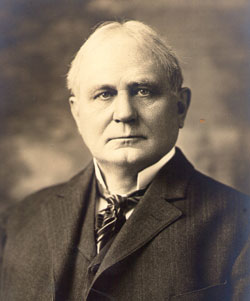Champ Clark (James Beauchamp Clark)

Champ Clark was elected to the United States House of Representatives in 1892. After a surprise loss in 1894 to William M. Treloar, he regained the seat in 1896, and remained in the House until his death, the day before he was to leave office. Clark ran for House Minority Leader in 1903 but was defeated by John Sharp Williams of Mississippi. After Williams ran for the Senate in 1908, Clark ran again for the position and won. When the Democrats won control of the House in 1911, Clark became Speaker. In 1911, Clark gave a speech that helped to decide the election in Canada. On the floor of the House, Clark argued for the recent Canadian–American Reciprocity Treaty and declared: “I look forward to the time when the American flag will fly over every square foot of British North America up to the North Pole.” Champ Clark went on to suggest in his speech that the treaty was the first step towards the end of Canada, a speech that was greeted with “prolonged applause” according to the Congressional Record. The Washington Post reported, “Evidently, then, the Democrats generally approved of Mr. Clark’s annexation sentiments and voted for the reciprocity bill because, among other things, it improves the prospect of annexation.” The Chicago Tribunal condemned Clark in an editorial, predicting that Clark’s speech might have fatally damaged the treaty in Canada; “He lets his imagination run wild like a Missouri mule on a rampage. Remarks about the absorption of one country by another grate harshly on the ears of the smaller.” The Conservative Party of Canada, which opposed the treaty, won the Canadian election in large part because of Clark’s speech.
In 1912, Champ Clark was the frontrunner for the Democratic presidential nomination, coming into the convention with a majority of delegates pledged to him, but he failed to receive the necessary two-thirds of the vote on the first several ballots. After lengthy negotiation, clever management by supporters of New Jersey Governor Woodrow Wilson, with widespread allegations of influence by special interests, delivered the nomination instead to Wilson. Clark’s Speakership was notable for two things. Clark’s skill from 1910 to 1914 in maintaining party unity to block William Howard Taft’s legislation and then pass Wilson’s. Also, Clark split the party in 1917 and 1918, when he opposed Wilson’s decision to bring the United States into World War I. In addition, Clark opposed the Federal Reserve Act, which concentrated financial power in the hands of eastern banks (mostly centered in New York City). Clark’s opposition to the Federal Reserve Act is said to be the reason that Missouri is the only state granted two Federal Reserve Banks (one in St. Louis and one in Kansas City). Clark was defeated in the Republican landslide of 1920 and died shortly thereafter in his home in Washington, DC. Champ Clark is the namesake of the small community of Champ, Audrain County, Missouri. The former Clark National Forest likewise was named after him.
Born
- March, 07, 1850
- USA
- Lawrencebug, Kentucky
Died
- March, 02, 1921
- USA
- Washington D.C.
Cemetery
- Bowling Green City Cemetery
- Bowling Green, Missouri
- USA



